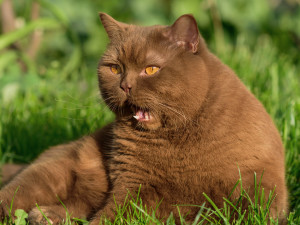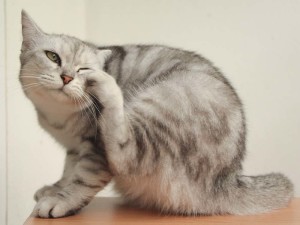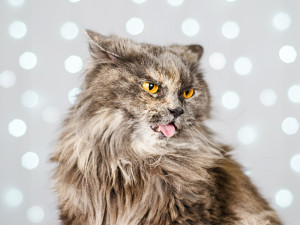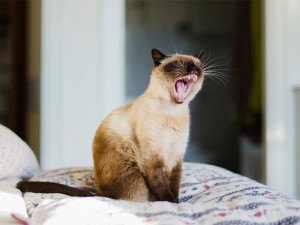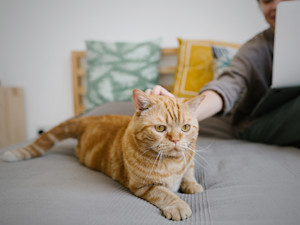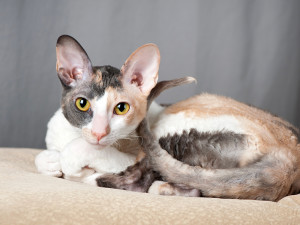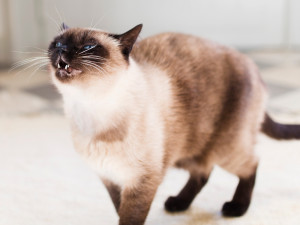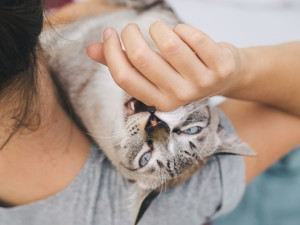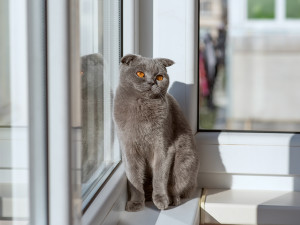Your Cat Is Gagging. Should You Panic?
It’s not always an emergency — but it could be.
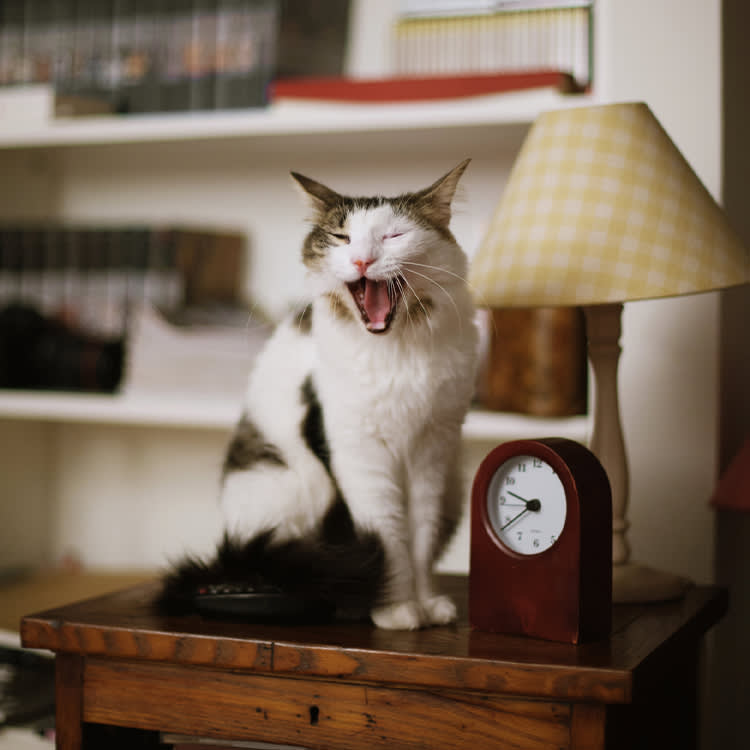
share article
Your cat is perfect (they would be the first to agree with that statement), but not every moment of parenting them is, uh, pleasant. For example, when you hear them make a retching noise from the other room and rush in to see them gagging, you might understandably panic — maybe after being thoroughly grossed out for a millisecond.
The next question that comes to your mind: Is this normal? Or should alarm bells be ringing in your head? Yes, and maybe. There are a few common causes for gagging in cats. Some are no biggie, but others warrant veterinary attention.
Your Cat Has Hairballs
This may be one of the most common causes for cats to gag. Cats are self-cleaning machines and will swallow fur as they groom themselves. Most of this fur will pass through the gastrointestinal tract without any issues, but some fur can stay in the stomach and wad into a ball. Cats will gag and expel these slimy fur globs, which you inevitably step on with bare feet (fun!). Hairballs are more common in long-haired cats and cats with intestinal issues, such as inflammatory bowel disease.
Regular brushingopens in a new tab can reduce the amount of hair your cat ingests. If your cat is grooming excessively, talk to your vet about ruling out underlying skin issues. Hacking up hairballs becomes concerning when it’s too frequent (more than once or twice a month) or accompanied by other symptoms, such as anorexia, vomiting, constipation, or lethargy. Although uncommon, large hairballs can get lodged in the gastrointestinal tract and cause an obstruction.
Your Cat is Eating Too Much Too Fast
Does this sound familiar: your cat stares, meows, and harasses you for food, only to hack it back up right after they eat? Eating too much food too quickly can lead to gagging, vomiting, and regurgitation. If your cat is a ravenous eater, consider alternative food bowlsopens in a new tab, automatic feeders, or smaller, more frequent meals. If your cat is territorial towards other pets in the home, a private feeding area may help with any anxiety associated with meal time.
Your Cat Has Oral Irritation
Severe dental disease can cause pain, gum swelling or recession, ulcers in the mouth, and discharge from beneath the gum line. This can make eating uncomfortable and lead to gagging and drooling. Cats who lick or chew caustic substances, such as chemicals, cleaning agents, and irritating houseplants can experience similar signs. This irritation can extend to the esophagus prompting them to gag when they swallow. A veterinary visit should be in your cat’s future if they are gagging and having difficulty eating or swallowing.
Your Cat Has a Nasopharyngeal Polyp
Polyps are benign masses that can originate in the middle ear or the back of the throat. While the cause of these masses is not typically known, inflammation from underlying viral infections is thought to play a role. As polyps grow, they can occupy space in the nasopharynx, the area in the back of the throat that connects to the nasal cavity. Cats with nasopharyngeal polyps can experience nasal discharge, sneezing, gagging, and difficulty swallowing. Polyp removal under sedation or anesthesia should provide rapid relief.
Your Cat Ingested Foreign Material
Cats will sometimes eat things they shouldn't, leaving them at risk for gastrointestinal obstruction. Cats are notorious for trying to swallow stringy things, such as thread, floss, and yarn. Pro tip: Don’t let your cat play with string. These materials are especially high-risk for causing linear intestinal obstructions. This occurs when a string-like object is anchored somewhere in the digestive tract and is not able to pass through in the intestines. Instead, the intestines will bunch around the object causing obstruction and trauma. This string can get stuck on the tongue and can lead to gagging.
Your Cat is Nauseated
Nausea is a pretty non-specific sign but can cause cats to gag, drool, or refuse food. Your cat may experience nausea for a number of reasons, including eating something they shouldn’t, organ disease, or an underlying infection. Your vet might recommend diagnostic tests, such as blood work and radiographs, to look into possible causes for nausea.
Your Cat is Actually Coughing
Coughing and gagging can look similar in cats. Common causes for coughing in cats include bronchitis, asthma, heart disease, or parasites, such as heartworms. Chest radiographs are often a first step in determining the cause. If coughing is accompanied by labored breathing or panting, your cat should be evaluated right away.
What Your Vet May Recommend
If your cat is gagging, your veterinarian will likely want to look deep in your cat’s mouth and check for dental disease, foreign objects, or polyps. This often requires sedation or anesthesia for a thorough investigation. Your vet might want to do a radiograph to evaluate the cat’s lungs and abdomen. Blood work can screen for underlying issues, such as kidney or liver disease.
If you’re not sure if your cat is gagging or coughing or if you just want to provide more information, recording what your cat is doing at home may be helpful to your vet’s office because your cat is unlikely to perform in front of the vet. Typical.

Dr. Alycia Washington, DVM, MS
Alycia Washington, DVM, is a small animal emergency veterinarian based in North Carolina. She works as a relief veterinarianopens in a new tab and provides services to numerous emergency and specialty hospitals. Dr. Washington is also a children’s book author and freelance writer with a focus on veterinary medicine. She has a special fondness for turtles, honey bees, and penguins — none of which she treats. In her free time, Dr. Washington enjoys travel, good food, and good enough coffee.
Related articles
![Owner pets senior ginger cat.]() opens in a new tab
opens in a new tab6 Common Health Concerns in Senior Cats
How to spot and how to treat them.
![An orange cat coughing on a bed.]() opens in a new tab
opens in a new tabHow to Help an Asthmatic Cat Breathe Easy
Everything you need to know about feline asthma, from someone who’s been there.
![Cornish Rex cat laying down on a pillow]() opens in a new tab
opens in a new tabThe Cat Breed-Behavior Connection
Which cats are more likely to have stranger danger? Bite the hand that feeds them? Do the zoomies? Scientists studied 5,700 pet cats and discovered some interesting traits.
![Siamese cat in the middle of sneeze]() opens in a new tab
opens in a new tabDid Your Cat Just Sneeze Like a Human Being? Here’s Why
Kitty sneezes can be alarming, but they’re not always cause for concern.
![cat biting person's hand]() opens in a new tab
opens in a new tabHow to Make Your Cat’s Oral Care as Stress-Free as Possible
Your cat’s oral hygiene is essential to their health. Take things slow and figure out what works best for your kitty’s pearly whites.
![Uncomfortable looking gray cat sitting on a window sill]() opens in a new tab
opens in a new tabShould Your Cat Go to the ER?
Here are six good reasons to haul tail to the emergency room.
